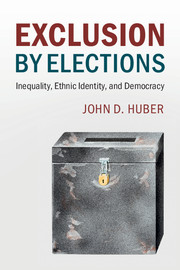1 - Introduction
Published online by Cambridge University Press: 18 May 2017
Summary
Since the mid-1980s there has been a marked increase in inequality across most democratic countries around the world. The super-rich now earn a much greater proportion of income and hold a much greater proportion of wealth than they did in the 1970s. The well-known Gini coefficient has steadily increased. The wages of rich individuals have increased much more quickly than those of poorer individuals, and the middle class has been hit hard, with the relative wage of the median earner steadily declining. Measured in any of a number of ways, the distribution of income across societies has become increasingly skewed toward the rich.
One might expect the competitive electoral process to create incentives for parties and candidates to adopt policies that redress economic inequalities: if economic advantage is concentrated in the hands of a few, the disadvantaged masses should elect parties committed to redistributive policies. This dynamic does occur in varying degrees across many democracies, but it is often striking how weak the democratic response is to inequality. As income and wealth in the United States become increasingly concentrated among the very rich in the United States, for example, so has the prominence of right-wing policies that call for a sharply limited role of government. Similar dynamics unfold in other countries, rich and poor. This frequently tepid response to the concentration of wealth presents a puzzle: Why do voters, faced with rising income disparities, often elect parties that oppose policies that could address these disparities? Or, put differently, why does it often seem so challenging for “class politics” – where an important element of electoral politics concerns the role of government in aiding the nonrich – to emerge in democratic polities?
An important part of the answer to this question can be found by considering a second puzzle, one that is typically treated as unrelated to concerns about inequality. In many countries, an “ethnic identity” with which one is born – by which I mean not only ethnic identities, but also racial, religious, linguistic, or tribal identities, depending on the context – becomes a salient element of electoral competition. When this happens, parties explicitly or implicitly try to win votes by competing for support from specific groups, and voters view their relevant electoral identity more in terms of their ethnicity than their class.
Information
- Type
- Chapter
- Information
- Exclusion by ElectionsInequality, Ethnic Identity, and Democracy, pp. 1 - 16Publisher: Cambridge University PressPrint publication year: 2017
